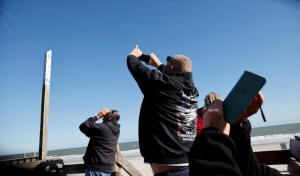How China's balloon over America steered its way into spying history
 Send a link to a friend
Send a link to a friend
 [February 06, 2023]
By Phil Stewart and Jeff Mason [February 06, 2023]
By Phil Stewart and Jeff Mason
WASHINGTON (Reuters) - When China's suspected surveillance balloon first
passed into U.S. airspace north of Alaska's Aleutian Islands on Jan. 28,
American officials believed there was a good chance it would keep
traveling on a northern trajectory over sparsely populated areas.
But two days later the balloon did something unexpected: it slowed down,
almost loitering, over Canada. Then it changed course and headed south
on a new trajectory that would eventually take it over the U.S. state of
Idaho, officials said.
"That's when we knew this was different," a U.S. official said, speaking
on condition of anonymity.
Chinese spy balloons have crossed into U.S. territory in the past but
the way that this one maneuvered, steering toward sensitive U.S. sites,
raised alarms at the North American Aerospace Defense Command (NORAD),
officials said.
The United States operates a military base and nuclear missile silos in
Montana, a state bordering Idaho.

The appearance of the Chinese balloon caused a political uproar in the
United States and prompted the top U.S. diplomat, Antony Blinken, to
cancel a Feb. 5-6 trip to Beijing that both countries hoped would steady
their rocky relations.
President Joe Biden asked for military options on Tuesday to deal with
the growing - but still undisclosed - crisis.
Military officials developed a plan to shoot down the balloon on
Wednesday as it flew over Montana.
Planning advanced to the point where Billings airport on Wednesday
issued a ground stop to clear nearby airspace as the military mobilized
F-22 fighter jets in case Biden ordered that the balloon be shot down.
"Even with those protective measures taken it was the judgment of our
military commanders that we didn't drive the risk down low enough, so we
didn't take the shot," a senior U.S. defense official told reporters on
Thursday.
Another U.S. military official, speaking on condition of anonymity, said
the debris would have fallen at least in a seven-mile (11-km) radius,
posing a mortal risk to Americans and potentially damaging
infrastructure.
The best and safest option was instead to take the balloon down over
water, officials concluded, a move that could also help U.S.
intelligence recover the Chinese equipment for study.
BALLOON MANEUVERS
The U.S. government has declined to say which sites the Chinese balloon
surveyed. It appeared to travel near sensitive U.S. bases including
Malmstrom Air Force Base in Montana, which oversees 150 intercontinental
ballistic missile silos, and Offutt Air Force Base in Nebraska, home to
U.S. Strategic Command, which is in charge of nuclear forces.

It also appeared to drift over Whiteman Air Force Base in Missouri,
which operates the Air Force's B-2 bomber.
One U.S. official, speaking on condition of anonymity, said the balloon
was able to linger in the winds over specific areas.
[to top of second column]
|

People photograph a suspected Chinese
spy balloon as it floats off the coast in Surfside Beach, South
Carolina, U.S. February 4, 2023. REUTERS/Randall Hill/File Photo

"We saw it do that. It loitered over certain sites. It went left,
right. We saw it maneuver inside the jet stream. That's how it was
operating," the official said, adding that the craft had propellers
and rudders.
China says the balloon was a civilian craft used for meteorological
and other purposes, and strayed into U.S. airspace "completely
accidentally."
On Wednesday, U.S. Secretary of State Antony Blinken and Deputy
Secretary Wendy Sherman met with senior officials from the embassy
of China to convey "a strong set of messages," a senior
administration official said.
Biden had already directed his team to protect sites from Chinese
collection of sensitive information as NORAD tracked the balloon's
movements across the continental United States.
The United States also started gathering information about the
balloon itself, including how it operated.
After sightings along the balloon's path, and public uproar swelled,
Blinken decided on Thursday to officially postpone his trip to
China, according to an administration official. On Friday, the
Pentagon said it expected the balloon to keep flying over the United
States for several more days.
SHOOT DOWN PREPARED
But after those public remarks, the balloon gathered speed, heading
toward South Carolina's coast. Officials said it wasn't clear how
much of that acceleration was due to the jet stream or the use of
the balloon's own steering.
Biden approved a plan to shoot down the balloon on Friday night
while he was in Wilmington, Delaware, setting off round-the-clock
military preparations to coordinate the mission.

NASA analyzed and assessed the debris field, based on the trajectory
of the balloon, weather and estimated "payload" of sensors, and a
U.S. military operation unfolded at sea and in the skies.
Multiple fighter and refueling aircraft joined the mission to take
down the Chinese balloon, but only one - an F-22 fighter jet from
Langley Air Force Base in Virginia - took the shot at 2:39 p.m.
(1939 GMT), using a single AIM-9X Sidewinder missile.
It punctured the balloon as it hovered at between 60,000 and 65,000
feet (18-20 km), and the payload came crashing down to the sea. The
debris field stretched for some seven miles (11 km), as predicted,
but most landed in relatively shallow water, just 47 feet (14 metres)
deep.
"That will make it fairly easy, actually," a military official said
of the recovery operation in the Atlantic.
Once the mission was complete, the U.S. government notified China
while the State Department briefed American allies.
China condemned the action, saying America was "obviously
overreacting."
(Reporting by Phil Stewart and Jeff Mason; Editing by Don Durfee and
Grant McCool)
[© 2023 Thomson Reuters. All rights
reserved.]This material may not be published,
broadcast, rewritten or redistributed.
Thompson Reuters is solely responsible for this content. |